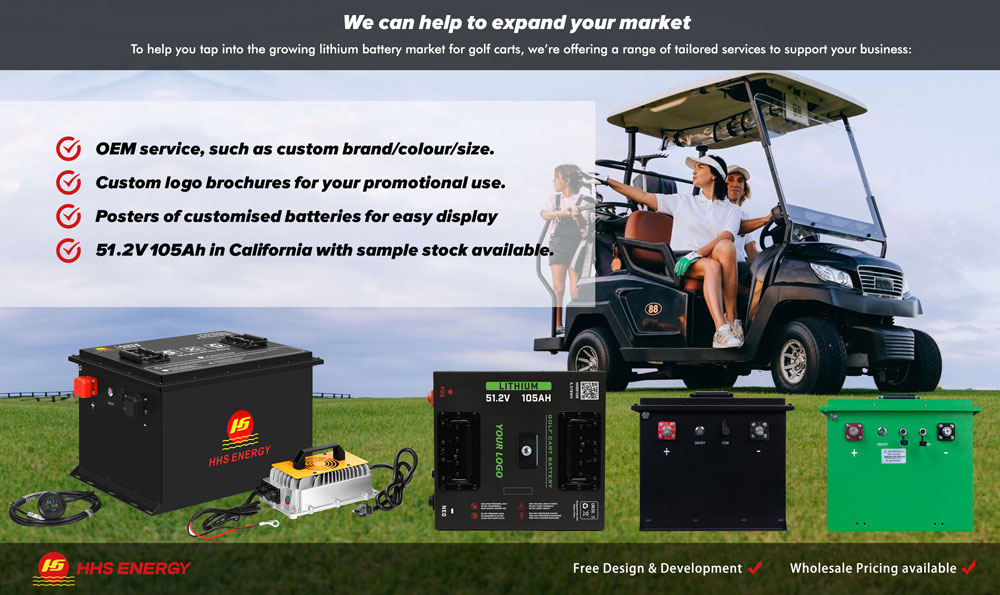How to Import Lithium Golf Cart Batteries from China: A Step-by-Step Guide
Importing lithium golf cart batteries from China can be a cost-effective way to source high-quality products, but the process requires careful planning and execution. Here’s a comprehensive guide to help you successfully import these batteries:
1. Identify Reliable Suppliers
- Research Manufacturers: Look for reputable manufacturers with experience in lithium golf cart batteries, such as HHS ENERGY or other leading suppliers.
- Verify Credentials: Use platforms like Alibaba, Global Sources, or Made-in-China to find suppliers. Verify certifications like ISO 9001, UL, CE, or RoHS to ensure product compliance.
- Request Samples: Ask for product samples to evaluate quality and compatibility with your needs.
2. Understand Regulations and Compliance
- Battery Certifications: Lithium batteries are regulated by international safety standards. Ensure the supplier provides certifications like UN38.3, IEC 62133, and MSDS.
- Import Regulations: Check your country’s import laws regarding lithium batteries. In the U.S., compliance with Department of Transportation (DOT) and Federal Aviation Administration (FAA) rules is crucial.
- Customs Duties: Familiarize yourself with applicable tariffs and duties. Lithium batteries may fall under specific Harmonized System (HS) codes.
3. Negotiate Pricing and Terms
- Price and MOQ: Negotiate the price and minimum order quantity (MOQ). Larger orders often yield better pricing.
- Payment Terms: Discuss payment options, such as a letter of credit (LC) or a 30/70 payment split (30% upfront, 70% after shipment).
- Incoterms: Understand Incoterms (e.g., EXW, FOB, CIF) to clarify responsibilities for shipping costs and risks.
4. Choose the Right Shipping Method
- Air Freight: Ideal for smaller shipments or urgent orders. Lithium batteries are classified as hazardous goods (Class 9), so ensure the carrier is certified to handle them.
- Sea Freight: Best for bulk orders due to lower costs. Confirm with your supplier that the batteries are properly packed and labeled for dangerous goods.
- Courier Services: For small orders, services like DHL, FedEx, or UPS can handle lithium battery shipments with proper documentation.
5. Arrange Proper Packaging
-
Lithium batteries must comply with international shipping standards. Ensure the supplier uses:
- Approved packaging materials.
- Labels for hazardous materials.
- Documentation, including the Material Safety Data Sheet (MSDS) and UN38.3 test report.
6. Handle Customs Clearance
- Customs Broker: Hire a customs broker to streamline the clearance process. They will handle documentation, tariffs, and duties.
-
Required Documents:
- Commercial Invoice.
- Packing List.
- Bill of Lading or Air Waybill.
- Battery-specific certifications (UN38.3, MSDS).
7. Plan Storage and Logistics
- Warehouse Requirements: Lithium batteries require temperature-controlled and fire-safe storage. Confirm your warehouse meets these standards.
- Local Transportation: Partner with a reliable logistics provider for distribution once the shipment arrives.
8. Maintain Ongoing Communication
- Establish clear communication with your supplier to monitor production timelines, shipping updates, and after-sales support.
Tips for a Successful Import
- Start Small: Begin with a trial order to test quality and logistics.
- Build Relationships: A strong relationship with your supplier can lead to better pricing and service.
- Monitor Regulations: Stay updated on lithium battery shipping and import/export regulations.
By following these steps, you can successfully import lithium golf cart batteries from China while ensuring compliance, quality, and cost efficiency.

